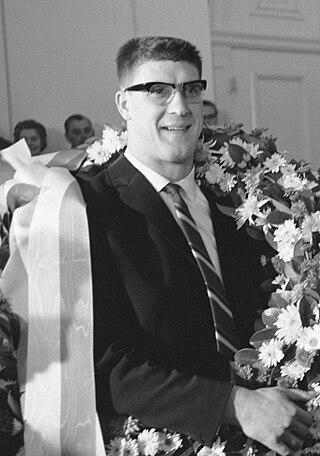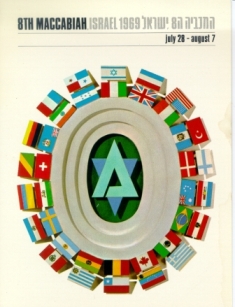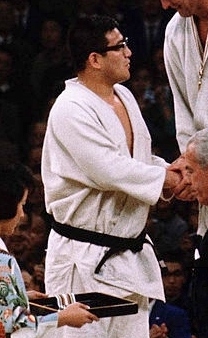
Antonius Johannes Geesink was a Dutch 10th dan judoka. He was the first non-Japanese judoka to win gold at the World Judo Championships, a feat he accomplished in 1961 and 1965. He was also an Olympic Champion, having won gold at the 1964 Summer Olympics in Japan, and won a record 21 European Judo Championships during his career.

Ariel "Arik" Ze'evi is a retired Israeli dan 6 black belt in judo. He had a long and successful career competing in half-heavyweight judo competitions. He won an Olympic bronze medal at the 2004 Summer Olympics in the men's 100 kg judo competition.

Alfred Harold Douglas Rogers was a Canadian Olympic competitor in judo, and the first Canadian to win an Olympic medal in the sport. He was an honoured member in the Canadian Sports Hall of Fame. His best results were a silver medal in the 1964 Tokyo Olympics and a gold medal at the Pan American Games, in 1967. He was a student of Masahiko Kimura.
James A. Pedro is an American retired World Champion and Olympic judoka, as well as a current judo coach. Pedro currently holds a 7th degree black belt in judo. He is the coach of Kayla Harrison, the first and currently only American to win an Olympic gold medal in judo.

At the 8th Maccabiah Games from July 29 to August 7, 1969, 1,450 athletes from 27 countries competed in 22 sports in Israel. The final gold medal count was the United States in first place (64), Israel second, and Great Britain third (11).

Lecturer Paul Kuniaki Maruyama was a member of the first American team to compete in judo in the Summer Olympics. Judo was first included in the 1964 Summer Olympics in Tokyo.

Takehide Nakatani is a retired judoka who won the first gold medal ever awarded in judo at the Summer Olympics as the Japanese competitor in the lightweight division (–68 kg).

Akio Kaminaga was a Japanese judoka who won a silver medal in the open weight category at the 1964 Summer Olympics.
Koji Sone was a Japanese judoka and world champion.
João Gonçalves Filho was a Brazilian sportsman. He competed in five Olympic Games in both swimming and water polo. Born in Rio Claro, São Paulo, he represented Brazil in swimming at the 1952 and 1956 Olympics and in water polo at the 1960, 1964, and 1968 Olympics.

Felipe Kitadai is a judoka from Brazil. He won a bronze medal at the 2012 Olympics and a gold at the 2011 Pan American Games. He also won gold medals six consecutive times in the Pan American Games Judo Championships: at 2011 Guadalaraja, 2012 Montreal, 2013 San José, 2014 Guayaquil, 2015 Edmonton and 2016 Havana.

The Japanese martial art and combat sport judo has been practised in Canada for over a century. The first long-term judo dojo in Canada, Tai Iku Dojo, was established by a Japanese immigrant named Shigetaka "Steve" Sasaki in Vancouver in 1924. Sasaki and his students opened several branch schools in British Columbia and even trained RCMP officers until 1942, when Japanese Canadians were expelled from the Pacific coast and either interned or forced to move elsewhere in Canada due to fears that they were a threat to the country after Japan entered the Second World War. When the war was over, the government gave interned Japanese Canadians two options: resettle in Canada outside of the 'Japanese exclusion zone' or emigrate to Japan.
Hayward Nishioka is a Japanese-American community college physical education instructor and former judo competitor.
Aaron Cohen is an American former judoka. He was a 5-time US national champion, and earned a silver medal in the 2008 US Olympic trials. He earned a bronze medal at the 2009 Maccabiah Games in Israel.
Bernard Lepkofker was a competitive judoka from Brooklyn, New York, in the United States. He was a two-time gold medalist at the Maccabiah Games in Israel, won a New York Judo gold medal, and twice won silver medals in the US national championships.
James Takemori was an American judoka and World War II veteran.
Steven Jay "Steve" Cohen is an American former Olympic judoka and Olympic coach. He won the US National Judo Championships in 1974, 1975, 1977, 1985, and 1987. He won a gold medal at the 1973 Maccabiah Games, a bronze medal at the 1975 Pan American Games, and a silver medal at the 1986 Goodwill Games.
Terry Farnsworth is a Canadian former Olympic judoka. He won a Canadian national judo championship in 1972 and 1973, competed at the 1972 Summer Olympics, and won a gold medal at the 1969 Maccabiah Games and a silver medal at the 1973 Maccabiah Games in Israel.
John Baylon is a Filipino judoka who has competed in the Summer Olympics and a multi-medalist in the Southeast Asian Games.









